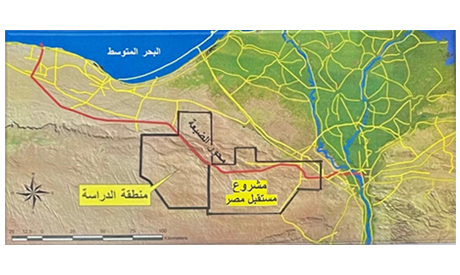


A new mega land-reclamation project dubbed the New Delta received a boost this week during a meeting between President Abdel-Fattah Al-Sisi, Prime Minister Mustafa Madbouli, and Minister of Agriculture and Land reclamation Al-Sayed Qoseir.
The project, which extends across one million feddans (1 feddan = 0.0042 km2) of land close to the northwestern coastline by Al-Dabaa, aims to increase Egypt’s arable land, currently standing at around three per cent of Egypt’s total area.
Al-Sisi ordered the immediate launch of work on the New Delta project, merging execution phases into one and tightening the timeline to buttress the state’s strategy of forming and creating new agricultural and urban communities.
The area involved will include industrial complexes built around agricultural production, a statement by the presidency said. Studies carried out by research teams at several agencies, including the Ministry of Agriculture, the National Services Projects Agency, and academic institutions, show that it is optimal for agricultural land reclamation.
The mega-project also includes the Egypt Future Project for agricultural production that will reclaim 500,000 feddans in the same area.
The project is a very promising undertaking, said Nader Noureddin, professor of soil and water sciences at the Faculty of Agriculture at Cairo University.
“Cultivating this area will hugely increase Egypt’s agricultural production,” he said. Noureddin explained that the location of the project has many advantages due to the presence of groundwater, and even if this is salty the level of salinity is not high and can be treated.
It is also close to the Delta region, which is densely populated and home to 55 per cent of Egypt’s population. The project will contribute to bridging the gap in agricultural production, he said. Egypt imports around 65 per cent of its food needs, so cultivating new land is a step towards self-sufficiency.
Egypt is one of the top importers of basic crops and the world’s top wheat importer. It imports 80 per cent of its fava beans, 100 per cent of its lentils, and 32 per cent of its sugar.
The land earmarked for the project is virgin land, and it is free from pollution, Noureddin said. Organic crops that Europe currently buys from North African countries such as Tunisia and Mauritania could also be grown there. The area is close to seaports on the North Coast, which would make exporting easier and also mean that these crops could be a new source of hard currency, Noureddin added.
The meeting with the president also reviewed infrastructure plans and other preparations that will be supervised by the Armed Forces Engineering Authority, including roads, services, sewage plants, electrical grids, and waterways to carry irrigation water.
The New Delta and Future Egypt Projects are not the first agricultural reclamation mega-projects to be supported by the president. A project to reclaim 1.5 million feddans of land was launched in December 2015 that saw the first harvest of a wheat crop in May 2016 at Sahl Baraka in the Farafra Oasis.
The project has so far increased Egypt’s agricultural land from 2.86 million to three million feddans.
The first phase of the three-phase project comprises nine areas covering 500,000 feddans. The second phase encompasses another nine areas over 490,000 feddans, and the final phase will cover an area of 510,000 feddans.
The preliminary cost of the 1.5 million-feddan project is estimated at LE60-70 billion and primarily relies on groundwater for irrigation. The project was awarded to the Egyptian Countryside Development Company (ECDC), which drafted the conditions for acquiring land in the project.
It allots plots of land to groups of 10 to 23 young people 21 years and older, who must form a company and sign a contract with the ECDC.
The project covers large areas of the country, especially in Upper Egypt, the Southern Valley, Sinai, and the Delta. Thirteen regions in eight governorates were chosen, mostly in Upper Egypt, namely Qena, Aswan, Minya, the New Valley, Marsa Matrouh, South Sinai, Ismailia, and Giza.
The areas were chosen after thorough studies to make sure they were close to urban areas and communication grids, as well as national roads and the electricity network.
Abdel-Moneim Al-Guindi, a professor at the Agricultural Research Centre’s Horticulture Research Institute, said the New Delta Project was promising because the soil was fertile and could support crops including vegetables, fruit, and field crops.
Al-Guindi said that in order for the Project to succeed, there must be urban and industrial development to create integrated communities in the areas concerned and for it to be sustainable over the long term.
He added that some crops would be a boon for Egypt, such as sweet potatoes which could be used in the production of high-quality bread. This could help cut down on wheat imports, which cost the state LE64 billion annually, he said.
Al-Guindi said that basic crops should be focused on, including animal fodder and corn. If these are produced at home, he said, it would cut the high cost of local meat and poultry, which is linked to prices on the world feed exchange.